Eiffage Bundle
How Does Eiffage Dominate the European Construction Scene?
The European construction and concessions sector is a battlefield of innovation and ambition, where Eiffage has established itself as a major player. From its roots in France to its current pan-European presence, Eiffage has continuously adapted and expanded, undertaking ambitious infrastructure projects and navigating evolving sustainability demands. This article dives deep into the Eiffage SWOT Analysis, and its competitive arena.
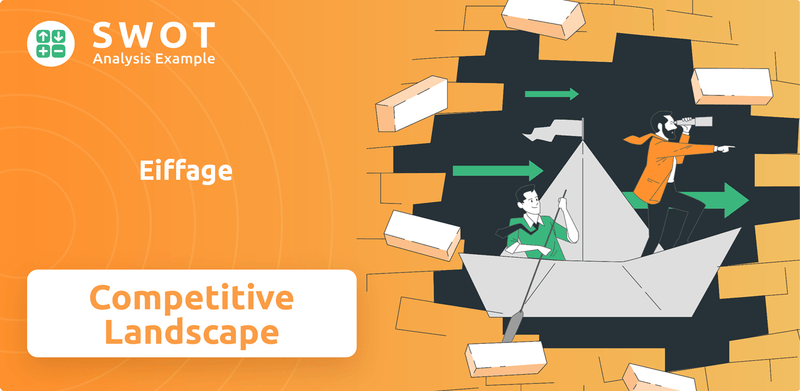
This exploration of the Eiffage competitive landscape will dissect its business strategy, examining its key competitors and how it maintains its market share. We'll conduct a thorough Eiffage market analysis, evaluating its financial performance and strategic partnerships. Understanding Eiffage's competitive positioning and its response to economic trends is crucial for investors and strategists alike, providing insights into its future outlook and growth potential within the Eiffage industry.
Where Does Eiffage’ Stand in the Current Market?
Eiffage's market position within the European construction and concessions sector is substantial, shaped by its integrated business model. The company's operations span construction, real estate, urban development, civil engineering, metal, energy, roads, and concessions. This diversification allows it to serve a wide array of clients, including public authorities, private developers, and industrial clients, enhancing its resilience in the Eiffage competitive landscape.
The company's geographic focus is primarily in Europe, with a strong presence in France, its home market, and expanding activities across other European countries. This strategic positioning is supported by a robust financial performance. For instance, in 2023, Eiffage reported revenue of €21.7 billion, demonstrating its significant scale within the industry and underlining its strong Eiffage financial performance.
Over time, Eiffage has strategically shifted its focus, placing greater emphasis on concessions. This shift provides stable, recurring revenue streams, contributing to its financial stability. This move toward concessions, such as motorways and public-private partnerships (PPPs), balances project-based revenue with long-term operational income, contrasting with its traditional construction-heavy origins. The company's strong order book further indicates future activity and demand for its services, which is a key aspect of its Eiffage business strategy.
Eiffage's revenue for 2023 was €21.7 billion, showcasing its significant scale in the construction and concessions industry. This revenue figure places it among the top-tier construction groups in Europe. The company's substantial revenue reflects its broad operational scope and strong market presence.
As of December 31, 2023, Eiffage's order book stood at €30.3 billion. This robust order book represents 17.5 months of activity, indicating strong demand for its services and a healthy outlook for future revenue. This figure highlights the company's ability to secure significant projects.
Eiffage's primary geographic focus is Europe, with a strong foothold in France and growing activities in other European countries. Its presence in France is particularly strong, where it holds a leading position in various construction and infrastructure segments. This strategic geographic focus supports its market position.
Eiffage's business model is diversified, encompassing construction, real estate, urban development, civil engineering, metal, energy, roads, and concessions. This diversification helps the company serve a broad range of customers, including public authorities, private developers, and industrial clients. Diversification enhances its resilience.
Eiffage's market position is reinforced by its financial health and strategic focus. The company's strong order book and revenue figures place it among the leading construction and concessions groups in Europe. Understanding its Eiffage market analysis is crucial.
- Revenue of €21.7 billion in 2023.
- Order book of €30.3 billion as of December 31, 2023.
- Strong presence in France and other European countries.
- Diversified business model across construction, concessions, and related services.
Eiffage SWOT Analysis
- Complete SWOT Breakdown
- Fully Customizable
- Editable in Excel & Word
- Professional Formatting
- Investor-Ready Format
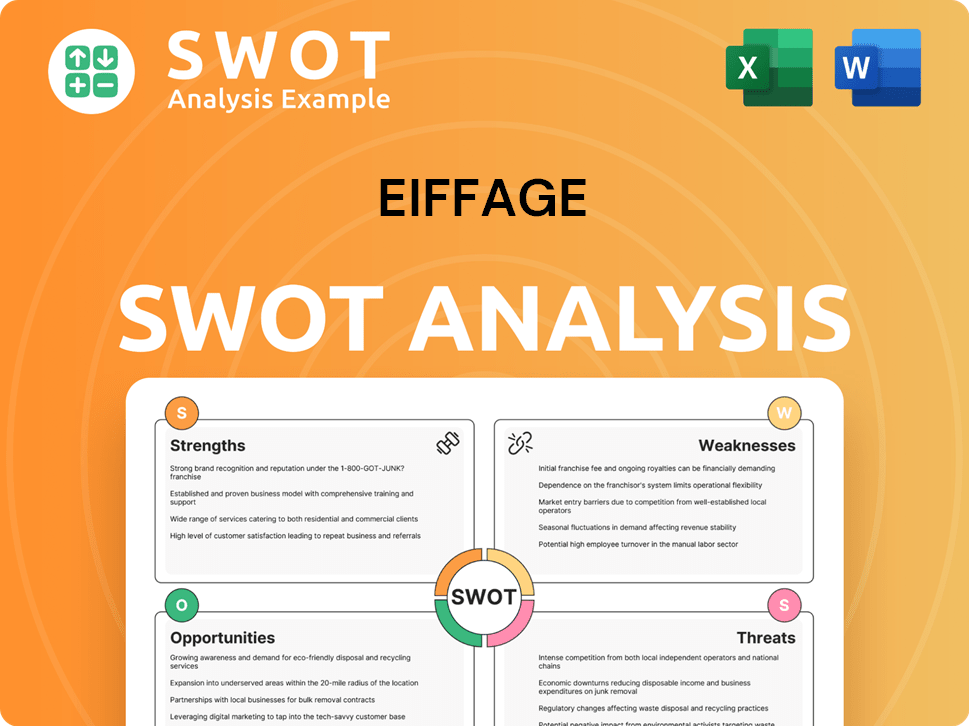
Who Are the Main Competitors Challenging Eiffage?
The Eiffage competitive landscape is shaped by a diverse array of rivals spanning various sectors, including construction, concessions, energy, and real estate. Understanding these competitors is crucial for a thorough Eiffage market analysis and assessing its Eiffage business strategy.
Direct competitors in the construction and civil engineering sectors include major players like Vinci and Bouygues. Indirect competition comes from specialized firms in energy and metal construction, as well as regional and national developers in real estate. The competitive environment is also influenced by international companies and emerging players focused on sustainable technologies.
Examining the Eiffage industry requires a detailed look at these competitors and their impact on the company's Eiffage financial performance and strategic positioning. This involves evaluating their market share, project portfolios, and strategic initiatives.
Vinci and Bouygues are primary direct competitors, both based in France. They compete with Eiffage in construction, concessions, and energy. These companies often bid for similar large-scale projects.
Vinci's global presence and diverse portfolio, including motorway concessions and airport operations, make it a strong competitor. Vinci reported revenues of approximately €68.8 billion in 2023.
Bouygues competes in building construction, public works, and real estate development. Bouygues Construction's revenue was approximately €14.2 billion in 2023.
Schneider Electric and Siemens Energy compete indirectly with Eiffage in energy infrastructure projects. These companies offer specialized solutions.
Smaller, specialized fabrication companies and regional developers also pose competition. These firms may focus on specific niches or geographical areas.
Companies focused on sustainable construction and digital solutions are emerging threats. These firms can disrupt the market through innovation.
The competitive landscape is dynamic, influenced by mergers, acquisitions, and international market entries. For instance, the Growth Strategy of Eiffage involves adapting to these changes through strategic partnerships and innovation. Understanding the Eiffage competitive advantages and disadvantages, along with its Eiffage strategic partnerships, is essential for assessing its future outlook and growth potential.
Eiffage faces intense competition in bidding for public and private contracts. This competition affects pricing, technical expertise, and project delivery timelines. The company's Eiffage construction projects portfolio and Eiffage infrastructure projects are key to its success.
- Price Competition: Competitors often engage in aggressive pricing strategies to win contracts.
- Technical Expertise: The ability to offer specialized skills and innovative solutions is crucial.
- Project Delivery: Meeting deadlines and delivering projects on time is a critical factor.
- Sustainable Construction: The increasing demand for green building and renewable energy projects influences competition.
Eiffage PESTLE Analysis
- Covers All 6 PESTLE Categories
- No Research Needed – Save Hours of Work
- Built by Experts, Trusted by Consultants
- Instant Download, Ready to Use
- 100% Editable, Fully Customizable
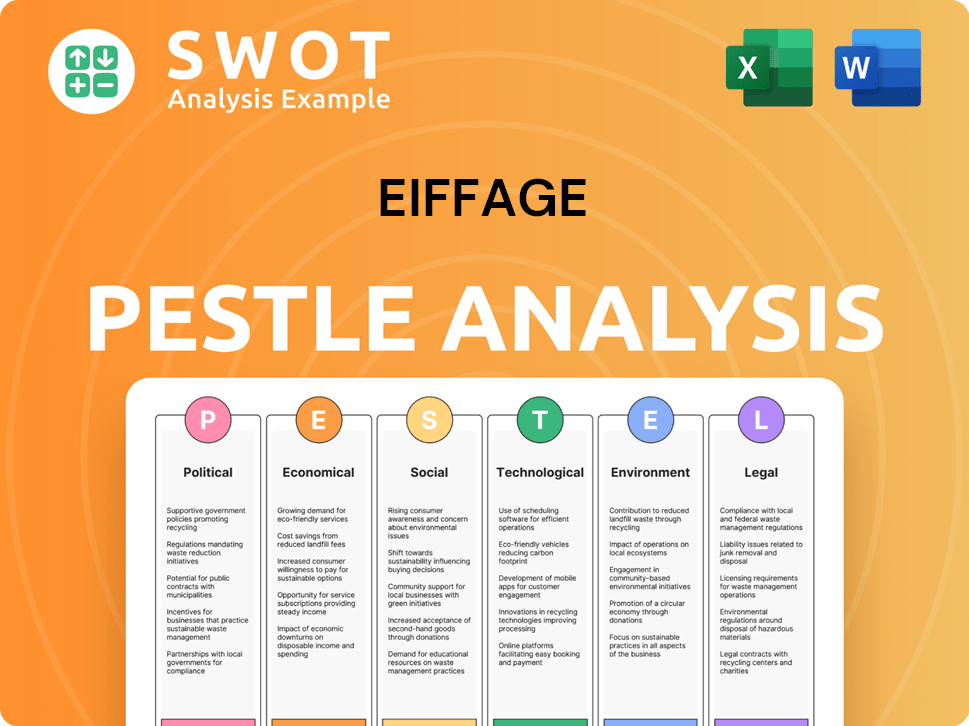
What Gives Eiffage a Competitive Edge Over Its Rivals?
The competitive advantages of Eiffage are rooted in its integrated business model, technical prowess, and strategic diversification. Eiffage's unique position as both a contractor and concessionaire allows it to capture value across the entire infrastructure project lifecycle. This integrated approach provides stable, recurring revenue streams, particularly from its concessions business, which acts as a financial anchor. This sets Eiffage apart from pure-play construction companies, fostering a virtuous cycle of reinvestment into its construction activities.
Eiffage's strong technical capabilities and expertise across various complex projects, including civil engineering, building structures, and energy solutions, are significant. This deep technical know-how, supported by continuous R&D investment, enables the company to undertake projects few competitors can match. Its established brand equity and reputation for quality and timely delivery also contribute to strong customer loyalty. Eiffage's extensive network of subsidiaries and local presence further strengthens its competitive position, allowing it to respond effectively to regional demands.
The company's focus on sustainable construction practices and energy efficiency positions it favorably as environmental considerations gain importance. These advantages have evolved, with concessions and sustainability becoming increasingly prominent, reinforcing Eiffage's resilience against market fluctuations. Understanding the Target Market of Eiffage is crucial for appreciating how these strengths align with customer needs and industry trends.
Eiffage's integrated model combines construction and concessions, providing a competitive edge. This allows for value capture across the entire project lifecycle. The concessions business generates stable, recurring revenue, which supports construction activities.
Eiffage possesses strong technical capabilities in civil engineering, building structures, and energy solutions. Continuous investment in R&D supports this expertise. This enables Eiffage to undertake complex projects that few competitors can manage.
Eiffage's diversification across various sectors and geographies enhances its resilience. This reduces dependence on any single market or project type. The company's focus on sustainable construction aligns with growing environmental demands.
Eiffage benefits from a strong brand reputation for quality and timely project delivery. Its extensive network of subsidiaries and local presence in key markets strengthens its position. This enables effective responses to regional demands and regulatory environments.
Eiffage's competitive advantages include its integrated business model, technical expertise, and strategic diversification. These strengths contribute to its strong financial performance and market positioning. For instance, the concessions business provided a significant portion of the company's revenue in 2024.
- Integrated Model: Combines construction and concessions for lifecycle value capture.
- Technical Prowess: Expertise in complex projects and continuous R&D investment.
- Strategic Diversification: Reduces dependence on single markets or project types.
- Brand Reputation: Strong reputation for quality and timely project delivery.
Eiffage Business Model Canvas
- Complete 9-Block Business Model Canvas
- Effortlessly Communicate Your Business Strategy
- Investor-Ready BMC Format
- 100% Editable and Customizable
- Clear and Structured Layout
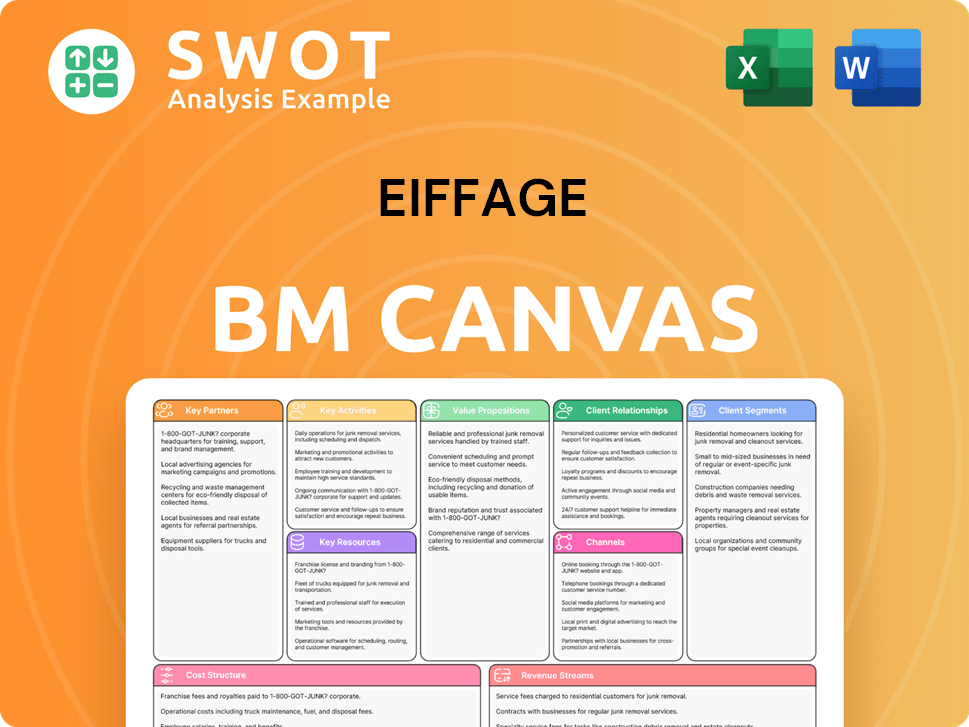
What Industry Trends Are Reshaping Eiffage’s Competitive Landscape?
The European construction and concessions industry, where Eiffage operates, is currently navigating a complex landscape of technological advancements, regulatory changes, and shifting consumer preferences. This dynamic environment presents both challenges and opportunities for companies like Eiffage, influencing their strategic decisions and financial performance. Understanding the Eiffage competitive landscape is crucial for assessing its position and future outlook.
The primary risks include economic downturns impacting infrastructure spending and inflationary pressures affecting project profitability. However, opportunities abound in sustainable infrastructure, renewable energy, and emerging markets. Eiffage's strategic focus on its concessions business and its emphasis on innovation and sustainability are key factors in its ability to mitigate risks and capitalize on growth opportunities. This approach is critical for maintaining a strong Eiffage competitive positioning.
Digitalization, including BIM and advanced project management tools, is becoming essential for efficiency. Sustainable construction materials and practices are increasingly demanded by clients and regulators. The push for renewable energy infrastructure and smart city development creates new market avenues for companies like Eiffage.
Rising raw material costs and labor shortages pose significant threats to project profitability. Stringent environmental regulations and the need for low-carbon solutions require continuous adaptation. Aggressive new competitors and potential slowdowns in public spending represent further challenges.
Growing demand for sustainable infrastructure, including renewable energy projects, presents significant growth potential. Expansion into emerging markets, particularly in Central and Eastern Europe, offers new revenue streams. The continued need for urban regeneration and smart city development creates additional opportunities.
Diversification of activities and international expansion are key strategies to mitigate risks and capitalize on opportunities. Emphasis on innovation and sustainability is crucial to meet future demands and maintain a competitive edge. Strengthening the concessions business provides resilience against market fluctuations.
Eiffage's strategy involves a multi-pronged approach to navigate the evolving industry dynamics. This includes a strong focus on sustainable solutions, such as renewable energy projects and eco-friendly construction materials. The company is also expanding its global presence.
- Diversification: Spreading activities across construction, concessions, and energy to reduce dependence on any single sector.
- International Expansion: Targeting growth in emerging markets to diversify revenue streams and reduce reliance on the European market.
- Innovation and Sustainability: Investing in new technologies and sustainable practices to meet client demands and regulatory requirements.
- Concessions Business: Leveraging the concessions business to provide a stable revenue stream and mitigate the impact of market fluctuations.
The Eiffage market analysis reveals several critical factors influencing its future. The company's ability to adapt to technological advancements, such as BIM and digital project management, will be essential for maintaining efficiency and competitiveness. Furthermore, the increasing focus on environmental sustainability, driven by regulations like the European Green Deal, requires significant investment in low-carbon solutions. For more insights into the company's financial structure, consider reading Revenue Streams & Business Model of Eiffage.
Eiffage Porter's Five Forces Analysis
- Covers All 5 Competitive Forces in Detail
- Structured for Consultants, Students, and Founders
- 100% Editable in Microsoft Word & Excel
- Instant Digital Download – Use Immediately
- Compatible with Mac & PC – Fully Unlocked
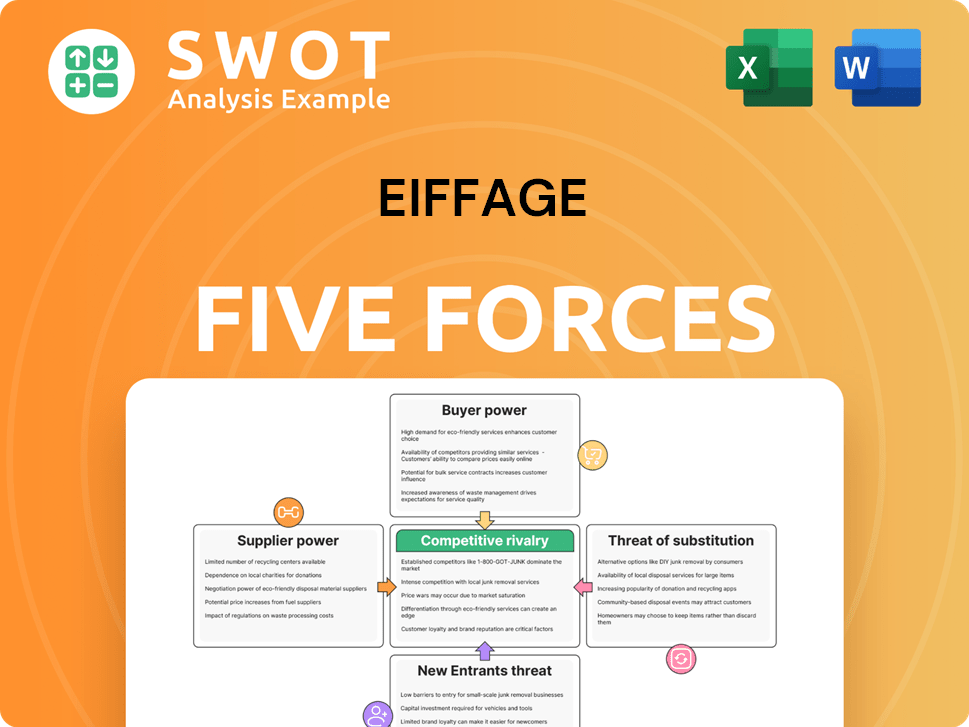
Related Blogs
- What are Mission Vision & Core Values of Eiffage Company?
- What is Growth Strategy and Future Prospects of Eiffage Company?
- How Does Eiffage Company Work?
- What is Sales and Marketing Strategy of Eiffage Company?
- What is Brief History of Eiffage Company?
- Who Owns Eiffage Company?
- What is Customer Demographics and Target Market of Eiffage Company?
Disclaimer
All information, articles, and product details provided on this website are for general informational and educational purposes only. We do not claim any ownership over, nor do we intend to infringe upon, any trademarks, copyrights, logos, brand names, or other intellectual property mentioned or depicted on this site. Such intellectual property remains the property of its respective owners, and any references here are made solely for identification or informational purposes, without implying any affiliation, endorsement, or partnership.
We make no representations or warranties, express or implied, regarding the accuracy, completeness, or suitability of any content or products presented. Nothing on this website should be construed as legal, tax, investment, financial, medical, or other professional advice. In addition, no part of this site—including articles or product references—constitutes a solicitation, recommendation, endorsement, advertisement, or offer to buy or sell any securities, franchises, or other financial instruments, particularly in jurisdictions where such activity would be unlawful.
All content is of a general nature and may not address the specific circumstances of any individual or entity. It is not a substitute for professional advice or services. Any actions you take based on the information provided here are strictly at your own risk. You accept full responsibility for any decisions or outcomes arising from your use of this website and agree to release us from any liability in connection with your use of, or reliance upon, the content or products found herein.